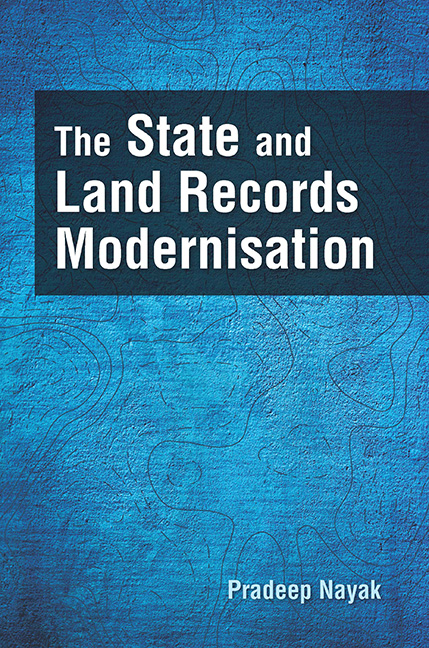Book contents
- Frontmatter
- Dedication
- Contents
- List of Figures and Tables
- Foreword
- Preface
- List of Abbreviations
- 1 The State, ICTs and Governance: A Theoretical Exploration
- 2 E-Governance in Public Policy Discourse in India
- 3 The State and the Policy of Land Records Management
- 4 The Computerisation of Land Records Programme in Odisha
- 5 The Computerisation of Land Records Programme in Karnataka
- 6 The Computerisation of Land Records Programmes in Karnataka and Odisha: A Comparative Study
- Conclusion: Beyond Techno-Managerial Governance
- Select Bibliography
- Index
Conclusion: Beyond Techno-Managerial Governance
Published online by Cambridge University Press: 02 December 2022
- Frontmatter
- Dedication
- Contents
- List of Figures and Tables
- Foreword
- Preface
- List of Abbreviations
- 1 The State, ICTs and Governance: A Theoretical Exploration
- 2 E-Governance in Public Policy Discourse in India
- 3 The State and the Policy of Land Records Management
- 4 The Computerisation of Land Records Programme in Odisha
- 5 The Computerisation of Land Records Programme in Karnataka
- 6 The Computerisation of Land Records Programmes in Karnataka and Odisha: A Comparative Study
- Conclusion: Beyond Techno-Managerial Governance
- Select Bibliography
- Index
Summary
Land continues to be the most crucial resource for an agrarian economy like India. It has regained importance as India is heading towards massive industrial-urbanisation and more and more agricultural land is being acquired for non-agricultural purposes. The importance of correct and up-to-date land records therefore cannot be underestimated. In addition to this, it is urgent in the context of granting forest land rights to the tribals and forest dwellers, inheritance rights to women, and vanishing common property resources across the country. However, the computerisation of land records programme clearly reveals that the schemes for modernisation of land records are being taken up for an incremental policy shift to facilitate the growth of land market and title regime. The overall performance of computerisation of land records has been a disappointing one if viewed from broader perspectives.
The National Knowledge Commission Report (2009) has aptly observed that many of the e-governance programmes are vendor driven and, ‘simply digitising the existing government processes merely adds an additional layers of expense, complexity, delay and confusion.’
ICT, public sector reforms and neoliberalism
It has been explained in the theoretical framework that the move towards reinventing government organisations on business principles like New Public Management and application and adoption of ICTs has its theoretical foundation in the contemporary neoliberal economic policies pursued by the states across the world. India is no exception to this trend. The sole objective of neoliberal structural reforms is to institutionalise the political agenda of a free market. The dominant concern of the administrative structure under the neoliberal economy is to promote the primacy of market values by adopting ‘techno-managerial practices and values.’
Since the 1990s, there has been a re-emphasis on the central role of the state and the complementariness or embeddedness of the state and market. The role of the state is now to focus on creating necessary conditions for securing and promoting market and property reforms apart from techno-managerial initiatives. It is therefore natural to expect international donor agencies like World Bank to promote neoliberalism as its sole policy objective with the help of multilateral aid agencies.
- Type
- Chapter
- Information
- The State and Land Records Modernisation , pp. 290 - 322Publisher: Foundation BooksPrint publication year: 2015



